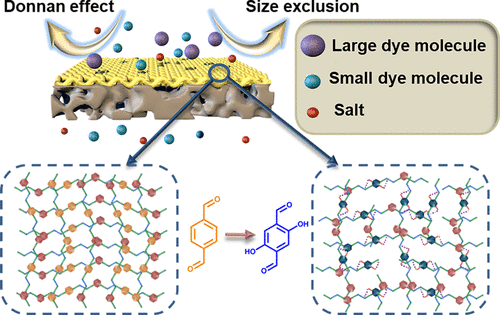当前位置:
X-MOL 学术
›
Chem. Mater.
›
论文详情
Our official English website, www.x-mol.net, welcomes your
feedback! (Note: you will need to create a separate account there.)
Controllable and Rapid Synthesis of Conjugated Microporous Polymer Membranes via Interfacial Polymerization for Ultrafast Molecular Separation
Chemistry of Materials ( IF 7.2 ) Pub Date : 2021-08-16 , DOI: 10.1021/acs.chemmater.1c02143 Kai Li 1 , Junyong Zhu 1 , Decheng Liu 1 , Yatao Zhang 1 , Bart Van der Bruggen 2, 3
Chemistry of Materials ( IF 7.2 ) Pub Date : 2021-08-16 , DOI: 10.1021/acs.chemmater.1c02143 Kai Li 1 , Junyong Zhu 1 , Decheng Liu 1 , Yatao Zhang 1 , Bart Van der Bruggen 2, 3
Affiliation

|
Conjugated microporous polymers (CMPs) featuring a well-structured microporosity are desirable molecular sieving materials, but most are fabricated under harsh synthesis conditions (e.g., high temperature and pressure) and are insoluble, which is challenging for processing them into continuous membranes. Herein, in situ formation of imine-linked, 31-nm-thick CMP nanofilms supported on porous polymeric substrates via catalysis diffusion-controlled interfacial polymerization (IP) under mild conditions is reported. The diffusion of catalyst acetic acid (AcOH) from the water phase to the interface enables acceleration of the aldehyde-amine condensation from the oil phase and thus the formation of CMP nanofilms within 10 min. The micropore size and thickness of CMP membranes were feasibly regulated by rational utilization of molecular ligands and control of IP parameters. Importantly, introducing hydroxyl groups adjacent to aldehyde enlarges CMP pore apertures from 1.0 to 1.7 nm due to the reduced reactivity induced by steric hindrance and the formed intramolecular hydrogen bonds. The newly synthesized 2,5-dihydroxyterephthaldeyde–m-phenylenediamine membranes display an extraordinarily high water permeance (240.0 L m–2 h–1 bar–1) and an excellent brilliant blue R (825.9 Da) rejection (i.e., 98.3%). In addition, the CMP membranes achieve an unprecedented sieving capability for both dye/dye and dye/divalent salt mixtures. This catalysis diffusion-controlled, interface-confined polymerization means may enable the development of new coherent microporous organic polymer films with potential for water purification, adsorption, and gas purification.
中文翻译:

界面聚合法可控快速合成共轭微孔聚合物膜用于超快分子分离
具有结构良好的微孔的共轭微孔聚合物 (CMPs) 是理想的分子筛材料,但大多数是在苛刻的合成条件 (例如高温和高压) 下制造的并且不溶,这对于将它们加工成连续膜具有挑战性。本文报道了在温和条件下通过催化扩散控制的界面聚合 (IP) 原位形成负载在多孔聚合物基材上的亚胺连接的 31 nm 厚 CMP 纳米膜。催化剂乙酸 (AcOH) 从水相扩散到界面能够加速油相中的醛-胺缩合,从而在 10 分钟内形成 CMP 纳米膜。CMP 膜的微孔尺寸和厚度可以通过分子配体的合理利用和 IP 参数的控制来调节。重要的是,由于空间位阻和形成的分子内氢键引起的反应性降低,在醛附近引入羟基可将 CMP 孔径从 1.0 纳米扩大到 1.7 纳米。新合成的 2,5-二羟基对苯二甲醚——间苯二胺膜显示出极高的透水性(240.0 L m –2 h –1 bar –1)和出色的亮蓝R (825.9 Da) 截留率(即 98.3%)。此外,CMP 膜对染料/染料和染料/二价盐混合物均实现了前所未有的筛分能力。这种催化扩散控制、界面限制的聚合手段可以开发具有水净化、吸附和气体净化潜力的新型连贯微孔有机聚合物薄膜。
更新日期:2021-09-14
中文翻译:

界面聚合法可控快速合成共轭微孔聚合物膜用于超快分子分离
具有结构良好的微孔的共轭微孔聚合物 (CMPs) 是理想的分子筛材料,但大多数是在苛刻的合成条件 (例如高温和高压) 下制造的并且不溶,这对于将它们加工成连续膜具有挑战性。本文报道了在温和条件下通过催化扩散控制的界面聚合 (IP) 原位形成负载在多孔聚合物基材上的亚胺连接的 31 nm 厚 CMP 纳米膜。催化剂乙酸 (AcOH) 从水相扩散到界面能够加速油相中的醛-胺缩合,从而在 10 分钟内形成 CMP 纳米膜。CMP 膜的微孔尺寸和厚度可以通过分子配体的合理利用和 IP 参数的控制来调节。重要的是,由于空间位阻和形成的分子内氢键引起的反应性降低,在醛附近引入羟基可将 CMP 孔径从 1.0 纳米扩大到 1.7 纳米。新合成的 2,5-二羟基对苯二甲醚——间苯二胺膜显示出极高的透水性(240.0 L m –2 h –1 bar –1)和出色的亮蓝R (825.9 Da) 截留率(即 98.3%)。此外,CMP 膜对染料/染料和染料/二价盐混合物均实现了前所未有的筛分能力。这种催化扩散控制、界面限制的聚合手段可以开发具有水净化、吸附和气体净化潜力的新型连贯微孔有机聚合物薄膜。






























 京公网安备 11010802027423号
京公网安备 11010802027423号